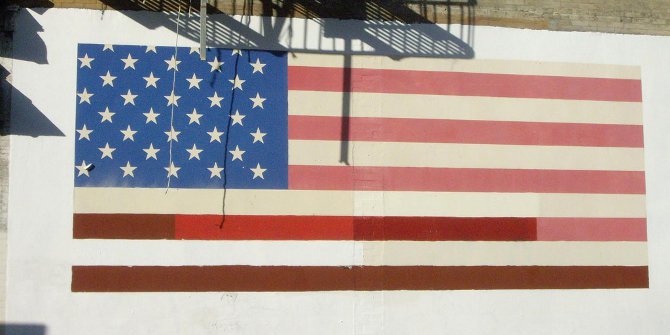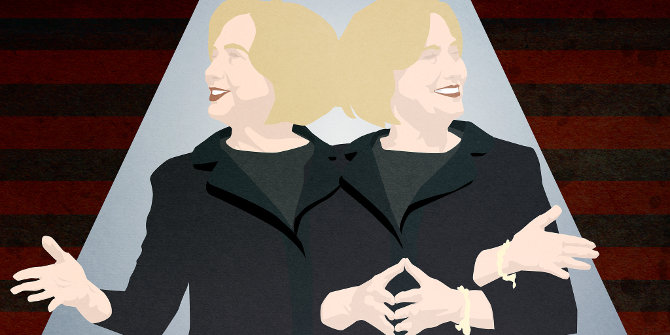 Ahead of his June 9th LSE Public Lecture, Joseph Nye spoke to USAPP Managing Editor, Chris Gilson about his new book, “Is the American Century Over?” He comments that concern about America’s decline dates back to the founding of the country, and argues that much of the current perceived decline is likely occurring through the ”rise of the rest”, as China, India and Brazil’s share of world GDP increases.
Ahead of his June 9th LSE Public Lecture, Joseph Nye spoke to USAPP Managing Editor, Chris Gilson about his new book, “Is the American Century Over?” He comments that concern about America’s decline dates back to the founding of the country, and argues that much of the current perceived decline is likely occurring through the ”rise of the rest”, as China, India and Brazil’s share of world GDP increases.
- Why do you think Americans have been continually worried over the years about the decline of their country?
Worry about decline goes all the way back to the beginning. By propounding high ideals, there is always that worry that reality will not live up to them. The Puritans left England to worship God in a purer way but they worried whether they lived up to that aspiration. The founding fathers worried that the new republic they established would follow the Roman republic into decline.
- In your new book “Is the American Century Over?” you argue that despite the concerns of many, American power is likely to continue well into this century. Why should we not be worried about China, given that many commentators seem convinced that its rise is inevitable?
China has an impressive record, and I expect it to continue to grow. But too many observers draw a straight line extrapolation from current growth rates into the future. History rarely follows a straight line. As I explain in the chapter on China in my book, there are good reasons to expect Chinese growth rates to drop well below what they call the “new normal” of 7 per cent. In addition to a statistical regression to the mean, China faces problems of demography, a middle income trap, and political participation.

- To many, the U.S. appears embroiled in all kinds of domestic strife – poor relations between minorities and police, growing inequality, droughts and other natural disasters. Could an American decline come from within?
The US has a number of problems — and always has had. It also has a capacity for self-renewal, partly through immigration. If we look at trends in demography, energy production, cutting edge technology (such as bio and nano); and leadership in higher education (15 of the top 20 universities in the world are in the US), I do not think absolute decline is likely.
- What events or trends could lead to an actual decline of U.S. power?
A certain amount of relative decline is likely through the natural processes of the”rise of the rest.” America’s share of world product will decline somewhat as the share of China, India, Brazil, Indonesia and others increases. A more precipitous decline could occur if they United States were to turn inward as it did in the period after World War I.
- If the dominance of American power is going to continue, what responsibilities and obligations does that place on the U.S. to other countries and to the world?
American dominance was never as great as some myths make it out to be, but it will be even less in the future because of the rise of the rest and the diffusion of power. Entropy, the decay of the ability to get work done, will be a greater danger than China. And if the largest country does not take the lead in the production of global public goods, they will be under-produced and the world will be the worse for that.
Joseph S. Nye Jr spoke at the US Centre at LSE and Department of International Relations public lecture, ‘Is the American Century Over?’ on June 9th. A podcast of the event is available here.
Please read our comments policy before commenting.
Note: This article gives the views of the author, and not the position of USApp– American Politics and Policy, nor of the London School of Economics.
Shortened URL for this post: http://bit.ly/1F1nLtx
_________________________________
 Joseph S. Nye Jr – Harvard University
Joseph S. Nye Jr – Harvard University
Joseph S. Nye Jr., University Distinguished Service Professor, and former Dean of the Harvard’s Kennedy School of Government. He has served as Assistant Secretary of Defense for International Security Affairs, Chair of the National Intelligence Council, and Deputy Under Secretary of State for Security Assistance, Science and Technology. His most recent books include The Power to Lead, The Future of Power, and Presidential Leadership and the Creation of the American Era. He is a fellow of the American Academy of Arts and Sciences, the British Academy, and the American Academy of Diplomacy. In a recent survey of internatinal relations scholars, he was ranked as the most influential scholar on American foreign policy, and in 2011, Foreign Policy named him one of the top 100 Global Thinkers.






